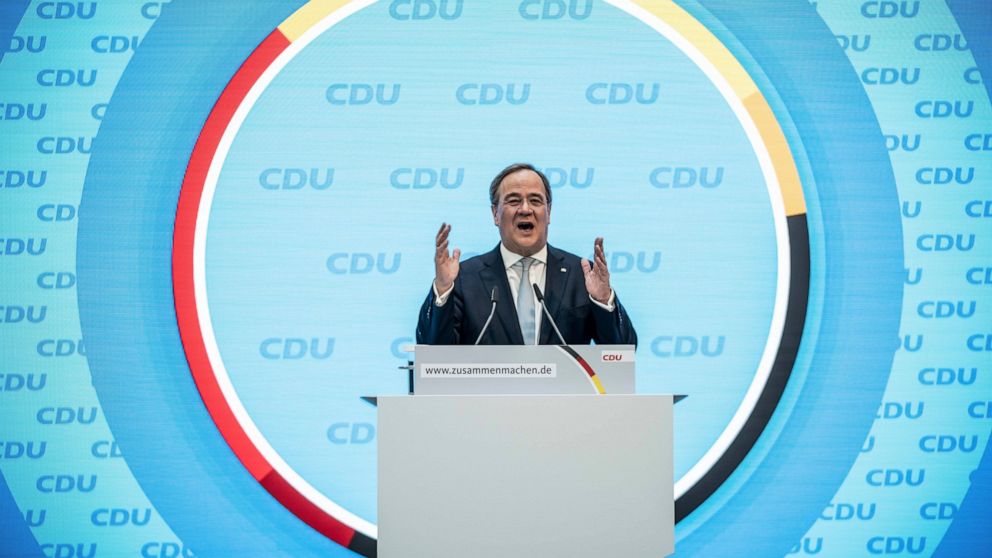Leader of Merkel’s party vows to boost German voters’ trust
The new leader of Chancellor Angela Merkel’s party has pledged to restore voters’ confidence after discontent over Germany’s pandemic management
BERLIN — The new leader of Chancellor Angela Merkel’s party pledged Tuesday to restore voters’ confidence after discontent over Germany’s pandemic management and a scandal over lawmakers enriching themselves in mask-procurement deals led to a sharp drop in its approval ratings.
Armin Laschet, the governor of Germany’s most populous state, won the leadership of Merkel’s Christian Democratic Union in January. He hopes to succeed Merkel as chancellor, but the center-right Union bloc dominated by the CDU hasn’t yet decided on its candidate for the Sept. 26 national election.
He hasn’t enjoyed a honeymoon. This month, the CDU suffered bad losses in two state elections, while national polls have shown the Union giving up gains it made on the strength of Merkel’s management of the early stages of the coronavirus pandemic.
That hasn’t been helped by allegations that several lawmakers from the CDU and its Bavarian sister party, the Christian Social Union, profited from business deals last year as Germany scrambled to secure masks. Some of those lawmakers have left their parties.
“Mistakes in pandemic management and some personal wrongdoing, selfishness in our own ranks, have led to confidence in the reliability and the capability of the Union as a whole sinking,” Laschet said. “I say today: We will change that, we will do better. I will take personal responsibility for that.”
German officials are banking on an increase in vaccine supplies after Easter to speed up the country’s so-far sluggish vaccination campaign. However, there are differences on how to respond to the current increase in infections. While Merkel advocates reversing some recent relaxations of restrictions, Laschet and others favor using rapid tests to keep shops and other facilities open.
Laschet’s speech Tuesday came as he launched the process of drawing up the Union’s election platform — something that its rivals for the chancellery, the environmentalist Greens and center-left Social Democrats, have already released.
The CDU stands for a “model of freedom but also of social responsibility,” Laschet said.
“We are the bulwark against ideology-driven policies that reach into every part of people’s lives,” he added.
Laschet’s pitch was long on his characteristic optimism, as well as talk of freedom and modernization, but — with the process of drawing up the party platform still ahead — short on details. He pointed to a wide-ranging need to repair technological shortcomings laid bare by the coronavirus pandemic.
Laschet said another lesson of the pandemic is that “you can’t regulate centrally from above, down to the last institution, who can be vaccinated, how, where and when, what forms have to be filled out.”
“We must put more trust in those who do this on the spot, give them more free space and more flexibility,” he added, calling for “a highly effective, slim, strong, flexible and effective state.”
Laschet called for Germany and Europe to become “the pharmacy of the world,” shaking off dependence on China, and stressed the importance of “green hydrogen” in boosting renewable energies.
“I want our country to become climate-neutral not with bureaucracy, as our competitors advocate, but with innovation, with sustainable technologies and with the instruments of the market economy,” he said.
The Union is expected to decide between Easter and late May whether Laschet or the CSU leader, Bavarian governor Markus Soeder, will be the center-right candidate for chancellor.
Soeder, who has advocated tougher coronavirus restrictions, has painted a darker picture of the political situation. He warned last weekend that “a mood for change is arising in the country.”
![]()


